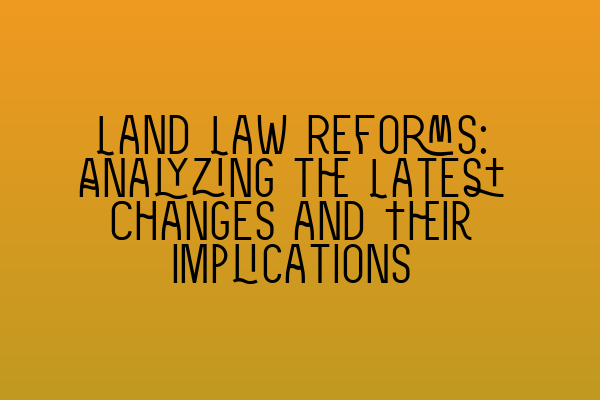**Land Law Reforms: Analyzing the Latest Changes and Their Implications**
Introduction
Land law is a complex and ever-evolving field, with frequent reforms and updates. Staying up-to-date with the latest changes is crucial for solicitors and professionals in the property law industry. In this blog post, we will examine the most recent land law reforms and analyze their implications on property transactions and legal practice.
1. The Land Registration Act 2002
One of the most significant land law reforms in recent years is the Land Registration Act 2002. This act introduced a new system of registration for land and property in England and Wales. It aimed to simplify and streamline the process of registering land ownership, enhancing certainty and transparency.
Under the Land Registration Act 2002, all land in England and Wales must be registered in the Land Registry. This registration process provides valuable information on the ownership, boundaries, and any encumbrances affecting the property. It also offers protection to registered owners, making it harder for adverse possession claims to succeed.
To navigate the intricacies of the Land Registration Act 2002, solicitors need a comprehensive understanding of its provisions and implications. Enrolling in SQE 1 Preparation Courses can equip aspiring solicitors with the necessary knowledge and skills to tackle land registration matters effectively.
2. Leasehold Reform
Leasehold reform has been a topic of significant debate and recent reforms have aimed to address the issues faced by leaseholders. The UK government announced reforms to leasehold legislation in 2021, including plans to abolish ground rents for new leasehold properties and introduce a new right for leaseholders to extend their lease to a maximum term of 990 years.
These changes will have a substantial impact on both residential and commercial leaseholders. Solicitors practicing in this area must be familiar with the latest reforms and understand how they affect lease negotiations, lease extensions, and leasehold enfranchisements.
SQE 2 Preparation Courses offer comprehensive training on leasehold law and reforms. By enrolling in these courses, solicitors can stay ahead of the curve and provide expert advice to clients affected by leasehold reforms.
3. Electronic Conveyancing
The development of technology has had a profound impact on land law. Electronic conveyancing is another reform that has revolutionized property transactions, making them more efficient and cost-effective. The introduction of electronic systems, such as the Land Registry’s Business e-services, has simplified the conveyancing process, reducing the need for manual paperwork and postal communication.
Solicitors must adapt to these technological advancements to provide a seamless conveyancing experience for their clients. Familiarity with electronic conveyancing systems and procedures is essential to keep up with the changing landscape of property transactions.
4. The Law Commission’s Consultation on Land Ownership
The Law Commission launched a consultation on land ownership in 2020, seeking views on potential reforms to the law around land ownership. The consultation explored various issues, including the creation, transfer, and termination of interests in land, as well as land registration and easements.
Solicitors should stay informed about the outcome of this consultation and any subsequent reforms that may arise. It is essential to monitor developments in land law and adapt legal practice accordingly. Regularly checking for updates on the SRA SQE Exam Dates can help solicitors plan their studies and stay up-to-date with any changes in land law.
Conclusion
As land law continues to evolve, solicitors and legal professionals must keep pace with the latest reforms and changes. The Land Registration Act 2002, leasehold reforms, electronic conveyancing, and ongoing consultations on land ownership are just a few examples of the developments shaping the field of property law.
By enrolling in SQE Preparation Courses, solicitors can enhance their understanding of land law and prepare for the challenges brought about by these reforms. Staying informed, adapting to technological advancements, and continually updating one’s knowledge is crucial for a successful career in property law.
Related Articles:
– [SQE 1 Practice Exam Questions](https://fqps.co.uk/sqe/sqe1-preparation/mcq-practice-quiz)
– [SQE 1 Practice Mocks FLK1 FLK2](https://fqps.co.uk/sqe/sqe1-preparation/practice-mocks-quiz)
– [SQE 2 Preparation Courses](https://fqps.co.uk/sqe/sqe2-preparation)
– [SQE 1 Preparation Courses](https://fqps.co.uk/sqe/sqe1-preparation)
– [SRA SQE Exam Dates](https://fqps.co.uk/sqe/sqe1-sqe2-exam-dates)
